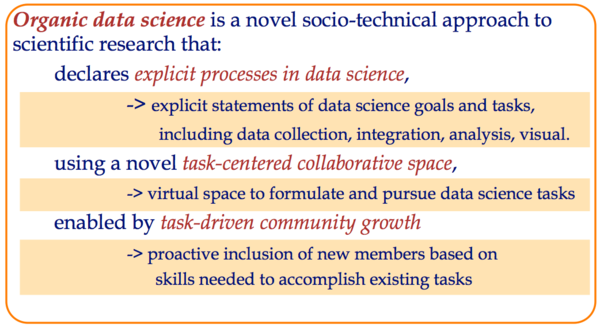Difference between revisions of "Develop Framework for Organic Data Science"
(Deleted PropertyValue: SubTask = Disseminate_results_from_the_Organic_Data_Science_framework) |
(Added PropertyValue: SubTask = Framework extensions) |
||
| Line 24: | Line 24: | ||
Participants=Felix_Michel| | Participants=Felix_Michel| | ||
StartDate=2013-10-01| | StartDate=2013-10-01| | ||
| + | SubTask=Framework_extensions| | ||
SubTask=Framework_Design| | SubTask=Framework_Design| | ||
SubTask=Human_Centered_Computing_to_Support_Organic_Data_Science| | SubTask=Human_Centered_Computing_to_Support_Organic_Data_Science| | ||
TargetDate=2016-09-30| | TargetDate=2016-09-30| | ||
Type=High}} | Type=High}} | ||
Latest revision as of 02:19, 2 February 2017
A Platform for Organic Data Science
Our goal is to allow scientists to formulate and resolve science processes through an open framework that facilitates ad-hoc participation and entice collaborators based on attractive science goals. We are pursuing a social computing approach that takes into account human aspects such as incentives and participation, while providing the fabric for representing and coordinating tasks involved in accomplishing science goals. Our approach will openly expose science tasks, facilitating inspection and engagement of new potential contributors. The collaboration will grow in an organic way, drawing in people and other contributions from existing data providers and cyberinfrastruture resources.
The Organic Data Science platform represents the technical approach in Organic Data Science. Our goal is to develop a social computing system that supports collaborative science.
The Organic Data Science platform is unique in its emphasis on supporting scientific tasks and processes. We are developing a detailed comparison with other frameworks for collaboration, see below.
The platform will be under development during the life of the project. Any comments and contributions are very welcome!
We draw from principles for social collaboration to guide the design of the platform.
The implementation builds on a Semantic Wiki platform.
